Meaning and usage
Etymology
"Sport" comes from the Old French desport meaning "leisure", with the oldest definition in English from around 1300 being "anything humans find amusing or entertaining".[6]
The Chinese term for sport, tiyu (体育; 體育) connotes physical training. The modern Greek term for sport is Αθλητισμός (athlitismos), directly cognate with the English terms "athlete" and "athleticism".
Other meanings include gambling and events staged for the purpose of gambling; hunting; and games and diversions, including ones that require exercise.[7] Roget's defines the noun sport as an "activity engaged in for relaxation and amusement" with synonyms including diversion and recreation.[8]
Nomenclature
The singular term 'sport' is used in most English dialects to describe the overall concept (e.g. "children taking part in sport"), with 'sports' used to describe multiple activities (e.g. "football and rugby are the most popular sports in England"). American English uses 'sports' for both terms.
Definition
The precise definition of what separates a sport from other leisure activities varies between sources, with no universally agreed definition. The closest to an international agreement on a definition is provided by SportAccord, which is the association for all the largest international sports federations (including association football, athletics, cycling, tennis, equestrian sports and more), and is therefore the de facto representative of international sport.
SportAccord uses the following criteria, determining that a sport should:[1]
- have an element of competition
- be in no way harmful to any living creature
- not rely on equipment provided by a single supplier (excluding proprietary games such as arena football)
- not rely on any 'luck' element specifically designed in to the sport
They also recognise that sport can be primarily physical (such as rugby or athletics), primarily mind (such as chess or go), predominantly motorised (such as Formula 1 or powerboating), primarily co-ordination (such as billiard sports) or primarily animal supported (such as equestrian sport).[1]
There has been an increase in the application of the term 'sport' to a wider set of non-physical challenges such as electronic sports, especially due to the large scale of participation and organised competition, but these are not widely recognised by mainstream sports organisations.
Competition
There are opposing views on the necessity of competition as a defining element of a sport, with almost all professional sport involving competition, and governing bodies requiring competition as a prerequisite of recognition by the IOC or SportAccord.[1]
Other bodies advocate widening the definition of sport to include all physical activity. For instance, the Council of Europe include all forms of physical exercise, including those completed just for fun.
In order to widen participation, and reduce the impact of losing on less able participants, there has been an introduction of non-competitive physical activity to traditionally competitive events such as school sports days, although moves like this are often controversial.

ليست هناك تعليقات:
إرسال تعليق